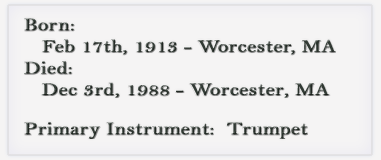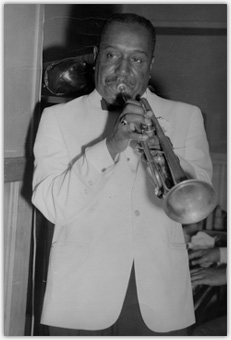
Trumpet player Elwood “Barney” Price had a tremendous impact on the Central Massachusetts jazz scene. He was a professional player since at 1929 and remained active until his death in 1988.
His main influences were Louis Armstrong, whom he saw play live at Mechanics Hall in Worcester in the early 1930’s (see Photo Gallery for a promotional poster for this Armstrong appearance) and Wendell Culley (a native of Worcester, MA). Price studied privately with Worcester based trumpeter Charlie Bowles.
Born in Worcester, MA on February 17, 1913, Barney Price received his first trumpet in 1926 at the age of 13 as a Christmas present from his mother. On the same Christmas night, trumpeter Wendell Culley, a Worcester native who was playing with regional bands at the time, (and later played with Cab Calloway 1930-31, Noble Sissle 1931-37, Lionell Hampton 1944-49 and Count Basie 1952-59) was in Worcester visiting relatives for the holiday. He asked to borrow Barney’s new trumpet. Price remembers that “Yeah, Wendell Culley broke in that horn of mine and I’m glad he did 'cause I’ve been playing one ever since”.
At age 15, Barney Price played trumpet in Worcester’s WPA Band (sponsored the Federal government WPA program). He also performed with the Commerce High School band until he graduated in 1932. His older brother William played drums and his sister, Agnes, played piano and was a vocal soloist while his younger brother, Milton, played trumpet. Barney Price was the only one of his siblings to pursue music professionally.
In 1929 at age 16, Barney Price joined drummer Boots Ward and the Nite Hawks, an ensemble which was formed in the mid 1920's as one of Worcester's first jazz bands. After Ward’s premature death, the group was led by Ray Schuyler (trombone) and soon taken over by Schuyler's cousin, Freddie Bates (tenor saxophone). Ward's drum seat was filled by Bill Toney and occasionally Ed Shamgochian (see Photo Gallery). Price and his close boyhood friend, saxophonist Howie Jefferson, remained with the Nite Hawks for nearly 10 years.
While under Boots Ward’s direction, this group worked two nights a week at Lunt's Pavilion in Sterling, MA, providing Barney Price with some of his very first professional engagements (see Photo Gallery). The Nite Hawks performed often in the Dixie Barbeque (corner of Exchange and Summer Streets, Worcester) which was owned by Boots Ward at that time. This lounge was known locally as the “Nile Bar”, and is reported to be the only jazz venue in Worcester owned by an African American during this time.
Later, under Freddie Bates' direction, the Nite Hawks also included trombonist John Byard (father of Jaki Byard) and featured arrangements by the 16 year old Jaki Byard who occasionally played trumpet and piano with the band. Freddie Bates and the Nite Hawks played primarily for dances in many venues including GAR Hall, Worcester. They played a live radio broadcast each Thursday from 7:00-7:15 p.m. on WORC radio in Worcester. The band broke up when Freddie Bates was Inducted into the armed services in 1943.
In 1938, Price founded the “Saxtrum Club” along with six other Worcester musicians: Howie Jefferson, Dick Murray, Ralph Briscott, Jaki Byard, Ed Shamgochian, and Harold Black. (In a 1998 interview with Chet Williamson of Worcester Magazine, Jaki Byard claimed to have named this club using the first letters from the instruments of the two prime movers, Howie Jefferson, SAXophone and Barney Price, TRUMpet.) The Saxtrum Club was first located on the corner of Glenn and Clayton Streets in Worcester, but was soon relocated to the corner of Laurel and Clayton Streets. Price was the secretary and treasurer for the club. For nearly ten years this cooperative hosted nightly jam sessions and was a magnet for regional players and visiting national artists as an after-hours jam venue. Worcester natives Barbara Carroll, Don Asher, Don Fagerquist, Don Byas and Jaki Byard (who reportedly often played through the night) were regulars at the Saxtrum Club.
After their performances in high profile downtown Worcester venues like the Plymouth Theater (late 1930s and the early 1940s) and the Warren Hotel (after 1945), many jazz artists of national stature performed with locals at the Saxtrum Club in late night jam sessions. According to Worcester Telegram and Gazette columnist Ev Skehan, Gene Krupa, Roy Eldridge, Chu Berry, Anita O’Day, Cozy Cole, Cab Calloway, Charlie Ventura, Don Byas, Luckey Millander, Fats Waller, Joe Venuti and Frank Sinatra all visited the Saxtrum Club. While stationed at Fort Devens, Al Hirt came regularly for two years to play at the Saxtrum club. Here, Barney Price and other members of the club were able to play with some of the major national jazz figures. Unfortunately, no recordings were ever made at the club. These sessions inspired Barney Price to continue playing in regional jam sessions throughout his life.
A permanent ensemble that was formed from players at the Saxtrum Club was led by drummer Tommie Collins. Eventually, the group was taken over and led by Roscoe Blunt Jr. (a 1949 graduate of the New England Conservatory’s Percussion Department). This ensemble was renamed the Rockie Blunt All-Stars. Personnel included Rockie Blunt Jr. (drums, vibraphone and arranger), Barney Price (trumpet and occasional vocals), Howie Jefferson (tenor saxophone), Morgan Sorrell (bass and vocals) and various pianists including Don Asher and Chet Lavallee. (see Photo Gallery) Aside from the high level of musicianship and inspired performances, this group is historically significant for two reasons:
1. The Rockie Blunt All-Stars was the first “mixed race group” to play jazz in Worcester. They performed in venues with an audience policy of “whites only” as well as in establishments owned by African Americans or those which allowed for racially mixed audiences. It is an unfortunate fact that Worcester remained a very racially biased city for many years. In fact, in October of 1924 (the year before Rockie Blunt was born), there was a large gathering of the KKK and the Kleagles in Worcester. Racial tensions remained high for several decades. (see Photo Gallery)
2. This ensemble is believed to be one of the first Worcester based jazz group to record. In 1948 and 1949, The Rockie Blunt All-Stars made a series of live recordings from the stage of Nelson’s Flamingo Lounge located on the corner of Main Street and Lunenberg Street, Moran Sq. in Fitchburg, MA. A Meisnner “flat disc” recorder and a single microphone were used for these recordings. (see Audio Clips)
From 1937 through the 1950's the Rockie Blunt All-Stars played in many concert settings and night clubs for white or black patrons. They often performed in Worcester's predominantly Black neighborhood in such jazz venues as the Valhalla (Summer Street). Another popular jazz night spot in the Summer Street area during the 1940s and 1950s was the Quinsigamond Elks Lodge #173 IBPOE, referred to as the "Black Elks", where Barney Price often played. It is assumed that he may have played at other black venues during that time such as the Sundome (Harding Street), Logan's Cafe, Dominic's Cafe (Clayton/Laurel area of Worcester), Tiny's Carousel (Route 9) and the Blue Marlin (Harding Street, Worcester), the Nile Lounge (corner of Summer and Exchange Streets) and Babe's Silver Dollar Cafe (Summer Street). Musicians often spent time at the Chicken Coop (Summer Street), which was restaurant owned by the Moffett family from the mid-1930s until the mid-1950s. (Pianist Mamie Moffitt led Worcester's very first jazz band in the early 1920's called "Mamie Moffitt and Her 5 Jazz Hounds".)
During the 1940’s and 1950’s, Barney Price worked days for the New York Central and the Pennsylvania Central Railroads. Throughout this period, he remained an active jazz performer playing in the pit orchestra at Worcester’s Plymouth Theater and playing club dates with the Rockie Blunt All-Stars as well as doing much freelance performing. In the 1960’s he worked for the Worcester County National Bank until his retirement in 1978, all the while playing nightly with various ensembles.
With his son Elwood "Bunny" Price on bass, Barney Price began a long stay at the Peacock Lounge in Auburn in 1963. The group was led by drummer Reggie Walley and featured Johnnie Catalozzi or Al Meuller on piano. Barney Price played much of the next six years in this venue, but often freelanced with other ensembles.
In the late 1960's he formed a group with his son Bunny Price on bass, called the Soul Jazz Qt. which featured Al Mueller on piano, Howie Jefferson on tenor saxophone, and Bobby Gould on drums. For three years they played Friday and Saturday nights at King's Corner on Route 13 in Leominster, MA. After Gould's death, the group moved to the Hottentotte (Austin Street, Worcester) and the drum seat was filled by Price's life long friend, Reggie Walley, owner of the Hottentotte. (see Links)
In the 1970's Barney Price played with pianist Don Fancy's Dixielanders, the Soul Jazz Qt. And his own group, the Barney Price Quartet which featured Price (trumpet), Everett Freeman (bass), Lennie Smith (drums), and any of three pianists: Dick Gay, Jackie Allen or Carl Stone.
It should be noted that from the 1930s until his death in 1988, Barney Price participated in established regional jam sessions, and was usually in the house band. These sessions took place in many venues including the Fox Lounge (Route 9 Westboro, MA), and at two well known Worcester jazz clubs owned by Reggie Walley, the Kitty Kat (252 Main Street Worcester from 1969-1976)) and the Hottentotte (8 Austin Street, Worcester from 1976-1983). He also played weekly sessions until 1987at the Quinsigamond Elks Lodge #173 (relocated to Chandler Street, Worcester).
With his wife Muriel, Barney Price had nine children, two of whom became professional musicians. Elwood “Bunny” Price (trumpet and bass) remains a very active musician in the Central Massachusetts jazz scene. A younger son, Tommy Price, is a New Jersey based drummer and public school music teacher. He graduated from Berklee College of Music, and has recorded extensively for the ESP label.
Barney Price was an active member of the African Methodist Episcopal Zion Church of Worcester (Belmont Street) where he played every Sunday with the resident choir and organist.
He is remembered warmly as an outstanding musician and a quiet, gentle man. Barney and his son Bunny Price gave generously of their time and talents to younger musicians, serving as mentors for the Central MA jazz community.
Sources:
Blunt, Roscoe Jr. Personal Interview. 8 Oct. 2003
LaFleche,Heidi J. “The Beat Goes On”. Worcester Magazine 11 Feb.1987
Morgenstern, Dan. "Ready, Willing, And Able: Jaki Byard". Downbeat Magazine. 21 Oct. 1965.
Price, Elwood "Bunny". Personal Interviews. 10 Oct. 2003 and 20 Oct. 2003
Talkin' History: Jazz In Worcester Then and Now (Symposium.Worcester Polytechnic Institute (WPI) Worcester, MA). Videocassette WCCA TV, 25 Feb. 2001. Video interviews of Central MA jazz artists. Videocassette of panel presentations.
Tubert,Jack. "Night Street" .The Worcester Evening Gazette 28 Mar.1971
Williamson,Chet. Personal resource library.
Worcester Magazine 18 Feb.1998
Worcester Historical Museum. Library Archives
Discography:
Price, Barney. Rockie Blunt All-Stars. 1948-1949. Recordings provided by Roscoe Blunt Jr. Re-mastered by Michael Drnek. Sept. 2003.
Acknowledgments:
A VERY SPECIAL THANK YOU to Chet Williamson (Arts and Entertainment Editor for Worcester Magazine) for his most generous contributions to this article.


